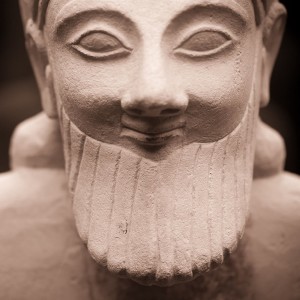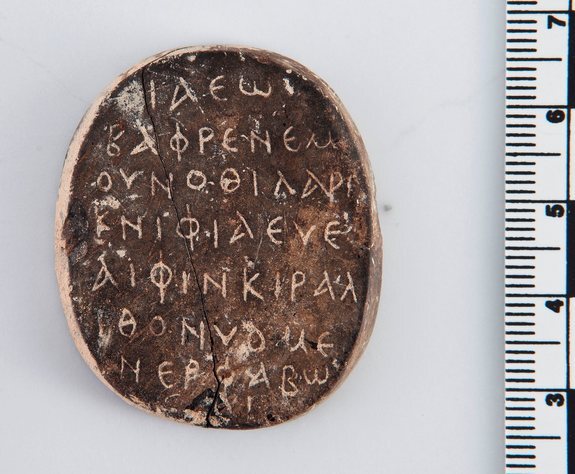The History of Cyprus Podcast
Welcome to The History of Cyprus Podcast -- a monthly series exploring the island’s past from 10,000 BCE to the 20th century. Each episode features in-depth conversations with leading scholars in archaeology, linguistics, political and social history, bringing academic insight to a wide audience. Together, we uncover the languages, cultures, conflicts, and legacies that shaped one of the Mediterranean’s most storied crossroads. Whether you’re a student, a history enthusiast, or just curious about Cyprus, this podcast offers something for everyone -- rooted in research, driven by storytelling. If you’d like to reach me, my name is Andreas. Please feel free to send me an email at cyprusthepodcast@gmail.com --------------------------------------------------------------- Follow The History of Cyprus Podcast Instagram and support the show on Patreon: https://www.patreon.com/TheHistoryofCyprusPodcast https://instagram.com/thehistoryofcyprus *The podcast image, ”Dressed for the Gods” (250BC) is from the British Museum taken by William Warby. Check out more of his work at flickr.com/photos/wwarby/
Episodes

Saturday Feb 15, 2025
Saturday Feb 15, 2025
For this month's primary source, our excerpt follows the infamous Easter Revolt* in 1192. After the Templars purchased Cyprus from King Richard the Lionheart, they initiated the heavy-handed exploitation of Cyprus, culminating in a revolt against the Templars and the subsequent transfer of Cyprus back to Richard. This will springboard us into my next interview with Professor Emeritus, Peter Edbury, and the Templar Rule in Cyprus. *This excerpt comes from the The Estoire d'Eracles -- an anonymous Old French chronicle and a continuation to William of Tyre's, "History of Deeds Done Beyond the Sea." The chronicle begins with the reconquest of Jerusalem in 630 CE during Roman emperor Heraclius' reign (hence the name, Heraclius' History) and ends with Saladin's conquest of Jerusalem.

Sunday Feb 02, 2025
Sunday Feb 02, 2025
Graffiti is most often associated with vandalism today. The idea of entering a church to carve into a fresco or scratch an icon feels unthinkable. Yet, in Medieval Cyprus, graffiti was a common practice—one rooted in reverence and spiritual expression. Far from desecration, these markings, whether scripts, scratches, shapes, or symbols, carried apotropaic or petitionary significance. They were often acts of devotion, not defacement. In this episode, I’m joined by archaeologist and historian Mia Trentin to explore the fascinating world of Medieval Graffiti in Cyprus!

Wednesday Jan 15, 2025
Wednesday Jan 15, 2025
Jacques Le Saige, a silk merchant from Douai, France, embarked on a journey to Jerusalem on March 19, 1518, visiting Cyprus from July to September of that year. In this episode, we hear of his visit to Saint Sophia in Nicosia, offering some of the earliest evidence of medieval "graffiti" -- in this case, marks left by visiting pilgrims. His own name, etched into the wall of the Church of St. Francis in Famagusta, was rediscovered in 1901.
Churches in Cyprus were, surprisingly, quite often riddled with graffiti. Most would assume those were marks of desecration. Was that always the case? Let this captivating primary source serve as a prelude to next month's episode, Medieval Graffiti with Mia Trentin!

Thursday Jan 02, 2025
Thursday Jan 02, 2025
In 1426, if but for a short while, Cyprus had two kings. King Janus of Cyprus and the ill-fated "Peasant King," Alexis, crowned by the people. The Peasant Revolt is a little known event in Cyprus' history but it is believed to have been triggered by the Mamluk invasion, the capture of King Janus and the sack of Nicosia. After the Muslim withdrawal, peasants revolted proclaiming the peasant Alexis as king. In short time, the rebellion was put down and Alexis was executed. Where was this rooted? How did it unfold? Join me with Dr. Chrysovalantis Kyriacou as we discuss the 1426 Peasant Revolt!

Sunday Dec 15, 2024
Sunday Dec 15, 2024
This month's Primary Source is based on the "Strambal(d)i Chronicle" written at the end of the 16th century by Diomede Strambali -- a native of Cyprus -- who by the end of the Ottoman conquest, had fled to Rome as a refugee and had his work commissioned in Italian. The Chronicle recounts one of the infamous revolts in Cyprus whereby a peasant king, King Alexis, was crowned, if but for a short while. This is a relatively unknown chapter in Cypriot history that has seldom been written about. But it is the only time in Cypriot history where Cyprus had two kings. The tale recounted in this Primary Source is believed to be largely lifted from Leontios Machairas' work but provides us with a fascinating springboard into next month's episode: The Cypriot Peasant Revolt of 1426 with Professor Chrysovalantis Kyriacou!
And if you enjoyed this Primary Source, please consider supporting the Podcast by joining as a Patron! https://www.patreon.com/TheHistoryofCyprusPodcast

Tuesday Dec 10, 2024
Tuesday Dec 10, 2024
Merry Christmas! Enjoy this bonus episode!Amathus is a peculiar place. It's one of the few archaeological sites that has a relatively recent founding (i.e., the Iron Age). It boasts some peculiar customs and archaeological finds (e.g., Hathor capitals) and it is home to the famous Amathusian Bilingual (an epigraphic find that attests Cyprus' mysterious third language). My guest for this episode is Thierry Petit from the University of Laval in Quebec City, Canada. He is a former international member of the French School at Athens and has been the director of excavations at the Palace of Amathus for the past 30 years. His latest work, “The Palace of Amathus: From the Origins to the End of Kingdoms” has just been published in collaboration with Antigone Marangou.

Monday Dec 02, 2024
Monday Dec 02, 2024
Prior to recording this episode, I had never put any real thought into Cyprus' role in Alexander the Great's campaigns. Afterall, Cyprus is rarely (if ever) mentioned when discussing Alexander's conquests. And yet I was floored to learn not only of its significant naval contributions but just how often Alexander himself recognized the superiority of Cypriot seafaring and engineering know-how to support his expeditions. Let's consider this excerpt in the lead up to the Siege of Tyre:"...[W]ith Cyprus too brought on side, we would be assured of supremacy at sea, and that of itself clears the way for our expedition to Egypt. When we have subdued Egypt, we shall have no further worries for Greece or our own country, and we can then make our move on Babylon with security ensured at home, our reputation enhanced, and the Persians cut off from the entire sea and all the land this side of the Euphrates." - Alexander quoted in Arrian's The Anabasis (17:4). The Siege of Tyre was a pivotal stepping stone opening up the East to Alexander's armies. It's with the coordinated naval efforts of Pnytagoras of Salamis, Androcles of Amathus, and Pasicrates of Curium (among others) that Alexander was able to take the Sidonian harbour of Tyre. And yet their contributions didn't end there. "Alexander had recruited teams of engineers from Cyprus" (17:5 Arrian) in order to assist in the construction of siege-engines and the building of a causeway that connected the mainland to the island of Tyre in perhaps one of the most impressive feats of engineering in all of Alexander's campaigns.
To my surprise, Cypriots were more than a mere footnote in the Siege of Tyre. They played vital roles throughout Alexander's campaigns into the East as oarsmen, engineers, explorers, soldiers, trierarchs, and some were even elevated to esteemed positions as Companions and even Satraps (see Stasanor of Soli who was appointed as Satrap of Bactria in modern-day Afghanistan). They accompanied Alexander as they explored the Hydapses River (modern-day Jhelum River in Pakistan and India) while others were specifically sent to explore hitherto unknown regions. "The most extensive of the exploratory voyages was that undertaken by the helmsman Hieron from Soli. He too was given a triaconter by Alexander, with instructions to coast round the entire Arabian peninsula..." (Arrian 17:4) They were an integral component to Alexander's war machine and instrumental in his many of his successes. In this month's episode, I'm excited to welcome researcher and historian, Andreas Parpas to discuss Cyprus' role in Alexander the Great's campaigns and its pivotal contributions to laying a foothold eastwards towards Babylon and beyond.

Friday Nov 15, 2024
Friday Nov 15, 2024
Arrian's "Anabasis of Alexander" provides us one of the most reliable accounts of Alexander the Great's campaigns -- including Alexander's Siege of Tyre. The siege, which took place in 332BC, relied heavily on Cypriot and Phoenician naval support and provided Alexander a foothold into the Persian Empire. In fact, Arrian speaks of relying on Cypriot engineers who would fit together many war machines for the campaign. With the support of the kings of Cyprus (including King Pnytagoras of Salamis who you'll hear referenced in the Primary Source) it is considered one of Alexander's most impressive accomplishments. In an incredible feat of engineering, a causeway was built connecting the Island of Tyre to the mainland, allowing Alexander to cross and successfully capture the island fortress. Cypriots would continue to furnish Alexander's campaigns with naval and engineering support throughout Alexander's incursion into Asia and including the Hydapses River in India (Jhelum River). Next month, I interview Andreas Parpas on Cyprus' role during Alexander's campaigns.**If you've enjoyed this Primary Source, please consider supporting the History of Cyprus on Patreon. Donations help directly fund the production of these historical sources: https://www.patreon.com/c/TheHistoryofCyprusPodcastYou can also help the podcast by following on Instagram and by leaving positive reviews on wherever you happen to stream the episodes :)

Sunday Nov 10, 2024
Sunday Nov 10, 2024
Be Happy and Drink Well. Commandaria stands proudly as a testament to the viticultural excellence of Cyprus. In fact, Commandaria holds the distinction of being one of the oldest continuously produced wines in the world. Though produced for centuries, the roots of Commandaria can be traced back to the Crusades in the 12th century. It even won first place in a semi-legendary wine-tasting contest held in thirteenth century France.* It was under the rule of the Knights Templar and the Knights of St. John that the wine garnered its name. For this episode, I invite Dr. Antonis Constantinou, who served as Director of Cypriot Department of Agriculture and has published several authoritative books and articles to discuss the history of Commandaria! **CHECK OUT PATREON FOR AN IMAGINING OF THE BATTLE OF THE WINES!**The Battle of the Wines (La Bataille des Vins in French) is a poem written by Henry d'Andeli in 1224. It describes a supposed historic wine-tasting event organized by King Philip Augustus of France. Over 70 wines from various regions, including France, Spain and Cyprus were sampled and judged by an English priest. The wines were divided into two categories: "Celebrated" for those he approved and "Excommunicated" for those that did not meet his expectations. In the end, a sweet wine from Cyprus, thought to be Commandaria, was named the winner and given the esteemed title of "Apostle."You can find Dr. Antonis Constantinou's book, "The Legend of Commandaria," on AMAZON!

Saturday Nov 02, 2024
Saturday Nov 02, 2024
Clearchus of Soli was an ancient philosopher who lived in the 4th century BCE and was primarily known for his contributions to ethics and moral philosophy. Clearchus was a student of Aristotle who is often associated with his Peripatetic school. He wrote extensively on Eastern Cultures and is thought to have traveled eastward-bound, to the Bactrian city of Ai-Khanoum (Alexandria on the Oxus?) in modern Afghanistan, in order to help Hellenize the city in a post-Alexandrian era. Join me as I welcome Professor Gertjan Verhasselt to discuss this fascinating and relatively unknown Cypriot philosopher, Clearchus of Soli!











